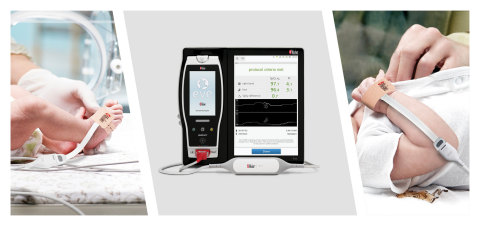Masimo Launches Dual SET® Pulse Oximetry

Masimo Dual SET® Pulse Oximetry with Root® and Eve™ (Photo: Business Wire)
CCHD affects approximately 2.5 to 3 newborns per 1000 live births1 and requires intervention soon after birth to prevent significant morbidity or mortality; later detection in infants also increases the risk of brain damage.2 Traditionally, newborns were observed for evidence of CCHD by physical assessment and monitoring for common symptoms, but studies have shown that physical assessment of newborns alone can be unreliable and may fail to detect some infants with CCHD before discharge.3-5 Adding screening with pulse oximetry can help clinicians identify CCHD before an infant becomes symptomatic.6 Clinically proven Masimo SET® Measure-through Motion and Low Perfusion™ pulse oximetry has been shown in more than 10 CCHD screening studies – representing over 300,000 babies – to increase the effectiveness of screening newborns for CCHD.1,7-16 For example, in a study of almost 40,000 infants, CCHD screening sensitivity increased from
Powered by Masimo SET® pulse oximetry, the Eve CCHD Newborn Screening Application is designed to simplify the CCHD screening process by providing step-by-step visual instructions, animations, and a detailed, easy-to-interpret display of screening results – standardizing and enhancing clinical workflows, improving consistency in screening practices among clinicians, and reducing the possibility of calculation errors. Eve also allows clinicians to incorporate perfusion index into screening, which has been shown to increase sensitivity to the detection of CCHD.18-19
Already available for Radical-7® and Rad-97® Pulse CO-Oximeters®, Eve is particularly well suited for display on Root’s large, high-resolution screen. With its built-in barcode scanner, Root can automatically associate patients with their screening results, and with its integration into the Masimo Hospital Automation™ platform, Root automates the transfer of those results to electronic medical records (EMRs) – eliminating the need for manual charting.
Now, with the addition of the new Masimo SET® MOC-9 module for Root – made possible by another key differentiator of the hub, its advanced, flexible connectivity capabilities – CCHD screening guided by Eve is even more streamlined and efficient: one pulse oximetry sensor can be connected to Root via Radical-7, and a second via the MOC-9 module, allowing for the pre- and post-ductal SpO2 readings needed for screening to be taken simultaneously rather than sequentially, with results conveniently displayed on one screen. This Dual SET® Oximetry technique streamlines the CCHD screening process, improving clinical workflows.
Root is a powerful, expandable hub that integrates an array of technologies, devices, and systems to provide centralized, multimodal monitoring and connectivity solutions. Root’s plug-and-play expansion capabilities allow clinicians to simultaneously monitor with numerous measurements in addition to dual oximetry Masimo SET®, such as advanced rainbow® Pulse CO-Oximetry measurements, O3® regional oximetry, and SedLine® brain function monitoring, for expanded visibility of patient status. Using Root in combination with the Hospital Automation platform, monitoring data from all connected devices can be automatically charted in EMRs.
Eve and the SET® module have not obtained FDA clearance and are not available in
@Masimo | #Masimo
About Masimo
ORi and RPVi have not received FDA 510(k) clearance and are not available for sale in
References
- de-Wahl Granelli A et al. Impact of pulse oximetry screening on the detection of duct dependent congenital heart disease: a Swedish prospective screening study in 39,821 newborns. BMJ. 2009;Jan 8;338.
- Taenzer AH et al. Impact of Pulse Oximetry Surveillance on Rescue Events and Intensive Care Unit Transfers: A Before-And-After Concurrence Study. Anesthesiology. 2010; 112(2):282-287.
- Ewer AK et al. NIHR Health Technology Assessment Programme: Executive Summaries.
- de Wahl Granelli A et al. BMJ. 2009;Jan 8;
-
Zhao et al.
Lancet . 2014 Aug 30;384(9945):747 54. -
Ewer AK, et al.
Lancet Child Adolesc Health . 2017;1(2):88 90. -
Zhao et al.
Lancet . 2014;384(9945):747-54. -
Gunaratne CR et al.
Sri Lanka J Child Health . 2021;50(1):04-11. - Slitine N et al. Int J Neonatal Screen. 2020;6(53).
-
Ewer AK et al.
Lancet . 2011;378(9793):785-94. - de-Wahl Granelli A et al. Acta Paediatr. 2007;96(10):1455-9.
- Meberg A et al. J Pediatr. 2008;152:761-5.
- Schena F et al. J Pediatr. 2017;183:74-79.
- Hamilçıkan S, Can E. J Perinat Med. 2018;46(2):203-207.
- Jawin V et al. PLoS One. 2015;10(9):e0137580.
- Gopalakrishnan S et al. Med J Armed Forces India. 2021;77(2):214-219
- Kemper et al. Strategies for implementing screening for critical congenital heart disease. Pediatrics. 2011 Nov;128(5):e1259-67. doi: 10.1542/peds.2011-1317.
- Siefkes H, et al. Am J Perinatol . 2020; 37(2):158 165.
- Uygur O et al. Pediatr Neonatol . 2019;60(1):68 73.
- Castillo A et al. Prevention of Retinopathy of Prematurity in Preterm Infants through Changes in Clinical Practice and SpO2 Technology. Acta Paediatr. 2011 Feb;100(2):188-92.
- Published clinical studies on pulse oximetry and the benefits of Masimo SET® can be found on our website at http://www.masimo.com. Comparative studies include independent and objective studies which are comprised of abstracts presented at scientific meetings and peer-reviewed journal articles.
- Taenzer A et al. Postoperative Monitoring – The Dartmouth Experience. Anesthesia Patient Safety Foundation Newsletter. Spring-Summer 2012.
-
McGrath S et al. Surveillance Monitoring Management for General Care Units: Strategy, Design, and Implementation.
The Joint Commission Journal on Quality and Patient Safety . 2016 Jul;42(7):293-302. - McGrath S et al. Inpatient Respiratory Arrest Associated With Sedative and Analgesic Medications: Impact of Continuous Monitoring on Patient Mortality and Severe Morbidity. J Patient Saf. 2020 14 Mar. DOI: 10.1097/PTS.0000000000000696.
- Estimate: Masimo data on file.
- http://health.usnews.com/health-care/best-hospitals/articles/best-hospitals-honor-roll-and-overview.
Forward-Looking Statements
This press release includes forward-looking statements as defined in Section 27A of the Securities Act of 1933 and Section 21E of the Securities Exchange Act of 1934, in connection with the Private Securities Litigation Reform Act of 1995. These forward-looking statements include, among others, statements regarding the potential effectiveness of Masimo SET®, Root®, Eve™, SET® MOC-9® Module, and the dual oximetry screening tool they combine to provide (the “Solution”). These forward-looking statements are based on current expectations about future events affecting us and are subject to risks and uncertainties, all of which are difficult to predict and many of which are beyond our control and could cause our actual results to differ materially and adversely from those expressed in our forward-looking statements as a result of various risk factors, including, but not limited to: risks related to our assumptions regarding the repeatability of clinical results; risks related to our belief that Masimo's unique noninvasive measurement technologies, including Masimo SET®, Root, Eve, SET® MOC-9 Module, and Solution, contribute to positive clinical outcomes and patient safety; risks related to our belief that Masimo noninvasive medical breakthroughs provide cost-effective solutions and unique advantages; risks related to COVID-19; as well as other factors discussed in the "Risk Factors" section of our most recent reports filed with the
View source version on businesswire.com: https://www.businesswire.com/news/home/20211101005286/en/
Masimo
949-396-3376
elamb@masimo.com
Source: Masimo







